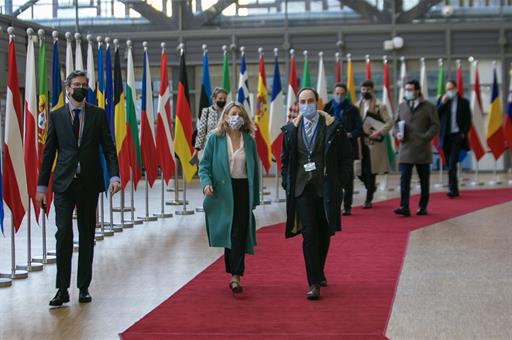EPSCO Council in Brussels
Spain leads Europe in advancing the minimum wage directive
News - 2021.12.6
The Second Vice-President insisted on the importance of this directive, in whose proposal Spain has exercised positive and constructive leadership. The initiative envisages common principles and indicators for establishing minimum wages.
"This proposal for a Directive responds to the scientific evidence that has shown that high and secure minimum wages have a positive impact on the economy and promote inclusive and shared growth. We must get closer to reality and abandon failed dogmas", the minister said in her speech.
In this regard, she stressed the need to strengthen collective bargaining at a sectoral level to ensure that the social partners have effective bargaining power, to promote the use of common international indicators that allow a fair assessment of the adequacy of wages, and to ensure that deductions and variations do not undermine the protective function of the minimum wage.
Díaz concluded her speech by calling for the best possible directive to be achieved by being ambitious and aware of the real scope of citizens' demands.
Social Alert Mechanism
The key role to be played by the Social Alert Mechanism in the future European Semester was also discussed during the EPSCO Council . This Mechanism seeks to identify and correct social imbalances at a European level on the basis of a set of indicators that have the same importance as macroeconomic indices.
"Social indicators have the same importance and impact as macroeconomic indicators. Thus, in order to adequately protect the citizens of our countries, we must reconcile, once and for all, efficiency and social justice, based on the certainty that economic governance is only effective when it is socially just", explained Díaz during her speech to her European counterparts.
In the bilateral meeting that the minister held with the Portuguese Minister of Labour, Ana Medes, the neighbouring country expressed its support for this instrument, which reinforces the social values on which the European project is based. Germany has also joined the support and, following a bilateral meeting between the Secretary of State for Employment and Social Economy, Joaquín Pérez Rey, and the Secretary of State for Labour and Social Policy, Rolf Schmachtenberg, has expressed its willingness to speed up the processing of the Mechanism.
The proposal also has the backing of the European Commissioner for Employment and Social Rights, Nicolas Schmit, who, during his recent meeting with Díaz in Madrid, expressed his support for work on the Mechanism to begin in the first half of 2022 in the Employment and Social Protection Committees, a necessary requirement for the initiative to prosper and be implemented in the ordinary functioning of the European Union.
The social dimension of the next European Semester was at the centre of the meeting in Brussels, where the wage transparency directive, among other issues, was discussed.
Wage transparency
Another of the future directives that was intensely debated at EPSCO was that of wage transparency, a legislative measure that Minister Díaz has defended as necessary to achieve effective equality between men and women in this area.
After recalling her Ministry's commitment to equality and equity and the measures promoted, such as equal and non-transferable family leave, as well as a wage transparency system to identify and correct unjustified wage inequalities, the Vice-President expressed her conviction that the directive will strengthen the identification of these inequalities and will contribute efficiently to eliminating the persistent wage gap between men and women, a factor which, in addition, has an impact on the invisibility of feminised work.
"These measures will have a positive impact on reducing the gender bias in wage structures and the undervaluing of women's work", said the minister, who said she was in favour of extending them to as many companies as possible and that workers' representatives should be able to effectively review their implementation.
European Semester 2022
With regard to the key points to be followed in the coming months in the European Union, the minister pointed out the urgency of extending the social focus of the European Green Pact.
The minister called for special attention to be paid to the social and employment aspects of the ecological and digital transition and, in particular, to the key role that active employment policies play or will play in these major transformations.
"The useful and strong Europe we are working towards is the one that understands that the fight against the climate crisis is directly linked to the fight against precariousness and inequalities", concluded Díaz.
In the fringes of the meeting, Spain, together with Italy, Belgium, Greece and Portugal, signed a letter to the European Commission requesting that the SURE instrument be made permanent, in order to provide an adequate and sustained response to future socio-economic imbalances and their impact on employment.
Non official translation





